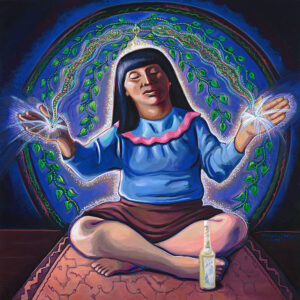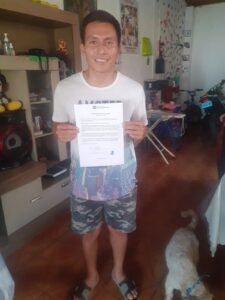by Mary Olivar, Center for Shamanic Education and Exchange Board Member
This is the second part of a series featuring the students of the Kurin Metsa School of Shamanism in Peru near the Ucayali River. The following is drawn from a conversation between our board member Adam Shaening-Pokrasso and Juan Enrique, a native Shipibo, and a student in the Kurin Metsa school. Juan Enrique is 21 years old, and has been apprenticing with his grandfather, Enrique Flores, for one and a half years. This apprentice program is funded through your donations to the Center for Shamanic Education and Exchange.

Juan Enrique
Since he was 10 years old, Juan Enrique has been curious about his grandfather’s work with plants and medicines, and is grateful for the chance to learn from him.
Juan Enrique describes his grandfather as a very patient teacher, who teaches by example and through experiential learning. From him Juan Enrique and the other students learn much about the uses and qualities of many of the plants of their region.
The Ucayali River basin where Juan Enrique and his family live, is the main headstream for the Amazon River. This area is rich in plant life and biodiversity. As an elder Onanya* who carries the wisdom of his parents, grandparents, and ancestors, grandfather Enrique is masterful in his plant knowledge and experience. He imparts this understanding of plants, their medicines, and their properties to his students through experiential learning. *Onanya is the Shipibo term for Shaman
One way this is done is through plant diets, or “samas”. Each sama involves a period of fasting and only ingesting a certain plant brew for many days to gain a relationship with that plant and to understand its unique energy and the particular kind of medicine and vibration that plant carries. Juan Enrique describes this, “Every time we diet we experience and learn a variety of things, and that is why we are focusing more on learning about more plants.”
Through donations, the Center has also funded a second project in this Shipibo community, for a medicinal plant garden. Enrique asked for support in creating this garden to grow medicinal plants that were becoming scarce or requiring the Shipibos to travel long distances to acquire. They now have a protected, fenced space and a dependable source of water to insure a flourishing garden, and access to these helpful teaching plants.
A particular plant that has been a great support to this community is the Matico plant. Matico when prepared in a certain way has been very helpful for people with acute lung issues. Juan Enrique has learned to prepare Matico and feels that it has been a great help to his family, keeping them healthy and protected from viral infections like Covid.
As Juan Enrique sees it, “For the Shipibos, it is that plants that help people to heal. They feel happy. They also have more faith in plants than in hospitals. It is very good for the Shipibos to be with the plants more than in the hospitals. The plants are the teachers and they are the ones that guide the Shipibos. Sometimes the same plants tell you how to prepare your remedies — how you have to take it. How to prepare it. How long the person should take the remedy. What they should not eat and what they can eat. All this is coming from the healing of the plants.”
“I think plants are also doctors, plants are very good doctors and very good guides too.”
Through his work with plants, Juan Enrique has been able to commune with the spirit of his deceased grandmother, Herlinda, who was also a very knowledgeable and powerful Onanya. In a ceremony with ayahuasca, a strong mixture of local plants that is an important part of the Shipibo traditions and spiritual practices, Juan Enrique experienced this vision:

Juan Enrique’s deceased grandmother, Herlinda – a very knowledgeable and powerful Onanya.
“I saw an ayahuasca vine that began to sprout and I saw a woman standing there. She was a beautiful woman and she said she was the ayahuasca mother. Next to me was my grandmother Herlinda, and my grandmother told me “Son, don’t be afraid, the plant is teaching you more. You have to continue with what you are learning.” When I saw my grandmother I felt sad, but also happy because I saw her, and that was very surprising to me. Then, with the big ayahuasca mother I also saw my grandfather Enrique, a tremendous person with great size and with a crown. It was very surprising for me, this vivid experience.” Juan Enrique has felt his grandmother’s presence in all of his ceremonial experiences with ayahuasca. “My grandmother is taking care of us, guiding us. You have to do this with the plants, ask the plants, sing and then you can follow their paths.”
“My grandfather told us that we have to be patient, everything is a process. And you’re not going to do it overnight. My grandfather tells me this and I understand him. Yes, little by little.”
Singing has also been an important tradition that Juan Enrique has been focusing on. He has been learning and creating Shipibo icaros, sacred songs that embody healing vibrations of particular plants’ allies. These ceremonial songs are a powerful tool for healing that is a foundational part of Shipibo traditions.
“Learning to sing the icaros was very transformative for me. Because before my grandfather told me, ‘Sing sing, you are going to sing everything in good time.’ I was desperate to sing, because my grandfather told me that there will be icaros that are going to flow out like karaoke. He told me ‘Everything in good time. The plant vine will make you sing, it will guide you to all that.’ And that’s what happened when I started singing, I felt happy. For me, that was transformative. And for me, I see that it is the icaro singing, to transmit energy to the people who are there with me.”
While many of his peers are more focused on socializing and pursuing a more modern lifestyle, Juan Enrique has found that studying medicinal plants to be something that inspires him and brings great happiness. His family is supportive of his studies as well.

Juan Enrique
“My relatives are happy, my father is happy, my mother too. My grandfather is happy, everyone is happy because I am following what my grandfather is teaching us. They think I’m following something…they also tell me that you have to continue, that you have to learn about plants since they are spiritual guides that make you see good things.”
Juan Enrique hopes that he too will be sharing this wisdom with future generations. When asked what he would like to share with his own children one day, Juan Enrique answered, “I would like for my children to be a good Shaman like my grandfather is. I know that everything is a process and I have to do it too, so I can be like my grandfather. I also would like one of my children to be like him. Everything that I am learning about plants from my grandfather, I also want them to know. I want them to have curiosity about plants, about everything I am learning… about how to give good healing energy to people, and how to work with and to prepare plants too.”
Juan Enrique describes how these studies have changed him:
“We’ve been on this program for about a year and a half and I see the world very, very different from how I used to see it before. Before, there was a lot of envy here and in many places. I saw a lot of bad things and it made me a little angry too, but now with the plants, I feel calmer and more focused. I don’t pay much attention to gossip or many things they say. Plants have made me know myself and find my inner self ~ be calmer in everything and in all aspects.”
When asked about a legend that inspires him, here is the story Juan Enrique shared:
“There is a story that my grandfather Enrique told me. This story is about the Chequnihuni, the people who live inside the jungle that we cannot see. They are people who know much about plants. They are very good hunters and very good fishermen. They also smell wonderful. Their scent is rich because they bathe with plants. My grandfather told me that when they smell us they say we smell bad. My grandfather told me once there was a person who bathed with medicinal plants by himself. Every day he prepared and bathed. Then he told his wife, I’m going fishing. But he didn’t return. He was missing for five days. On the fifth day he returned and later he told his wife about everything that had happened to him. While he was fishing, the Chequnihuni saw him and smelled him, they felt that he was of them too. So the Chequnihuni had taken him with them. It is said that the Chequnihuni can take you along their special long, long path. When you are there you will want to return, but there will no longer be any paths. You may despair, but if you stay, that can be as strong as you want. So it was there that the Chequnihuni took the man, to where they lived. They taught him to fish and hunt using special drops prepared with plants to put in his eye. With these drops, he was able to see the world around him and fish very clearly. He was already a very good fisherman and they taught him many more things, including much about what they knew of many plants.”
“This inspired me. I too wanted to know the Chequnihuni. I asked my grandfather which plants were good for bathing and he told me. I prepared the plant bath myself. For five days I did as he told me. Then I went to the jungle and sat, calmly contemplating a beech tree. When I was here, I felt that there was a person who was watching me. She was tall, she had long hair, but she hid in the tree. I was a little scared, but I approached the tree and there was nothing. There was no one there anymore. Again, I became still and sat. Again I saw her, but closer. Since I am curious, again, I approached the tree, and again nothing was there. Then I remembered that my grandfather had told me that if I did bathe with that of the plants, the Chequnihuni are going to allow you to see them. And I remembered what my grandfather had told me, that they can take you and you can come in a month or a week or you can stay there with them. Remembering that, I quickly went home. I already told my grandfather what had happened to me. He told me yes those are the Chequnihuni. That was during the day. They walk in the afternoon and at night. But my grandfather told me the Chequnihuni no longer walk so much during the day now they walk more at night, of course the community is already growing and there are many people. This is the reason why they walk at night. It is preferable for them. This is the story that motivated me to want to know about them.”
Hear Juan Enrique sing his icaro, a sacred song that embodies healing vibrations. This particular icaro is about medicinal plants, and thanks them for their wisdom and guidance, and asks these plants to bring in good energy for everyone who hears it.
“I am also grateful for you for the support you gave us and for the help. Thanks to my grandfather I am getting to know more plants that I did not know and all of that is very wonderful for me and I feel happy. Thank you, yes, very happy!”
For more information on the Kurin Metsa School of Shamanism, please click the button below.
